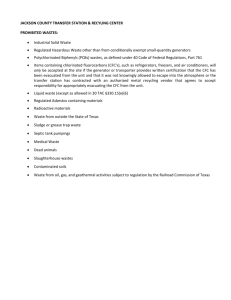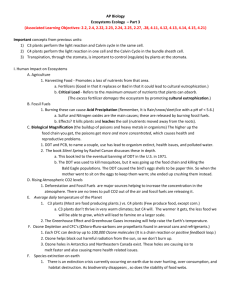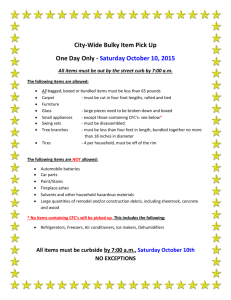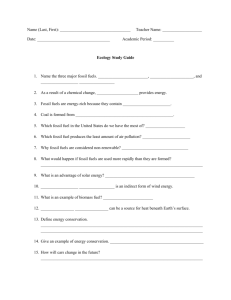Name Date ______ Block ___ Define Environmental Science – the
advertisement
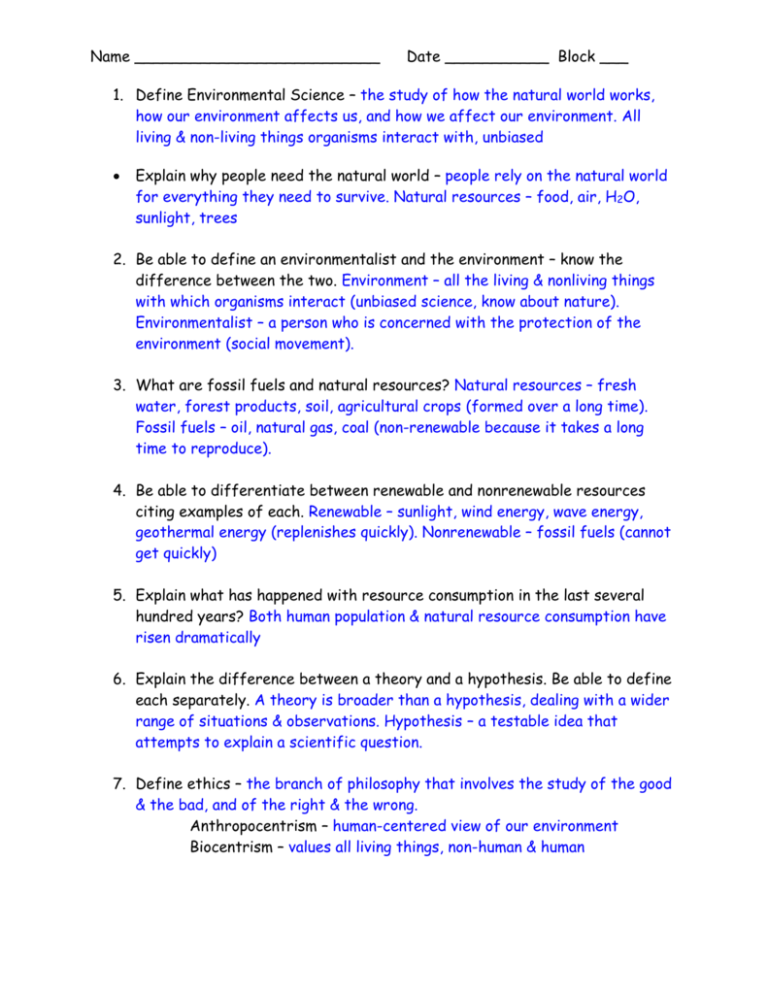
Name __________________________ Date ___________ Block ___ 1. Define Environmental Science – the study of how the natural world works, how our environment affects us, and how we affect our environment. All living & non-living things organisms interact with, unbiased Explain why people need the natural world – people rely on the natural world for everything they need to survive. Natural resources – food, air, H2O, sunlight, trees 2. Be able to define an environmentalist and the environment – know the difference between the two. Environment – all the living & nonliving things with which organisms interact (unbiased science, know about nature). Environmentalist – a person who is concerned with the protection of the environment (social movement). 3. What are fossil fuels and natural resources? Natural resources – fresh water, forest products, soil, agricultural crops (formed over a long time). Fossil fuels – oil, natural gas, coal (non-renewable because it takes a long time to reproduce). 4. Be able to differentiate between renewable and nonrenewable resources citing examples of each. Renewable – sunlight, wind energy, wave energy, geothermal energy (replenishes quickly). Nonrenewable – fossil fuels (cannot get quickly) 5. Explain what has happened with resource consumption in the last several hundred years? Both human population & natural resource consumption have risen dramatically 6. Explain the difference between a theory and a hypothesis. Be able to define each separately. A theory is broader than a hypothesis, dealing with a wider range of situations & observations. Hypothesis – a testable idea that attempts to explain a scientific question. 7. Define ethics – the branch of philosophy that involves the study of the good & the bad, and of the right & the wrong. Anthropocentrism – human-centered view of our environment Biocentrism – values all living things, non-human & human Ecocentrism – judges actions in terms of their benefit or harm to the entire ecological system, both living & nonliving & their relationships among them. 8. Be able to state our concern for the ozone, UV rays, and CFC’s. CFC’s break down in the upper atmosphere and react with ozone, destroying it in the process. UV radiation breaks down CFC molecules releasing chlorine atoms. Causes skin cancer – UV rays, CFC’s found in old spray cans, air conditioners 9. What is Science? A process of learning about the natural world and a summary of what we have already learned 10. What does it mean to be an effective scientist? One who actively seeks evidence that provides answers to scientific questions and are open to results that change or even disprove a previously accepted idea 11. What is the scientific method? List the steps involved in this procedure. Make sure to include definitions for quantitative data vs. qualitative, peer review journals, independent vs. dependent variables, and a controlled experiment. Identify problem Gather information Hypothesis Experiment Conclusion Communicate results Qualitative – descriptive Quantitative – numbers Independent – cause (I can change) Dependent – effect (gets its value from the independent variable) Controlled experiment – testing (changing) 1 thing at a time 12. Describe an alternative method a scientist can use to gather evidence. Observational studies, field studies, build a model 13. Define carbon footprint. Hint -- Recall video “The Human Footprint” for ideas. Resources consumed & waste left behind


